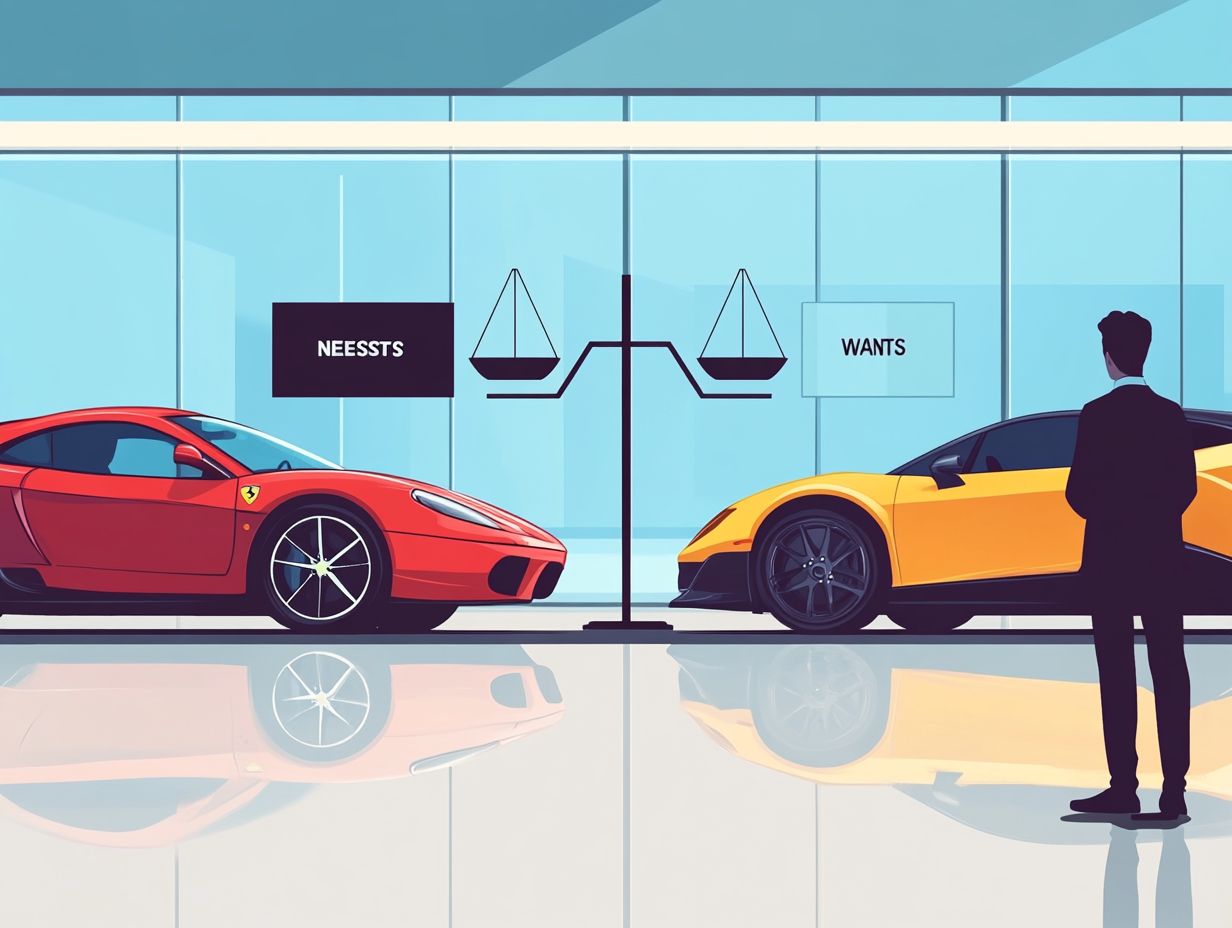How to Balance Needs vs Wants in Car Buying?
Buying a car can feel like a thrilling adventure, but it can also be overwhelming with so many options available.
Recognizing the difference between your needs and wants is essential for making a smart choice. This guide makes car buying a breeze by simplifying the process into clear, manageable steps from identifying essential features to setting a budget that fits your lifestyle.
You ll learn how to research and compare vehicles, negotiate with dealerships, and account for long-term costs. By the end of this journey, you ll be ready to make a confident decision about your next vehicle.
Contents
- Key Takeaways:
- Understanding Needs and Wants in Car Buying
- Prioritizing Needs and Wants
- Setting a Budget
- Researching and Comparing Vehicles
- Negotiating with Dealerships
- Finalizing the Purchase
- Frequently Asked Questions
- What is the difference between needs and wants in car buying?
- Why is it important to balance needs and wants in car buying?
- How do I determine my needs and wants in a car?
- Should I compromise on my needs for my wants in car buying?
- How can I stick to balancing my needs and wants in car buying?
- What should I do if I am struggling to balance my needs and wants in car buying?
Key Takeaways:

- Determine essential and non-essential features before car shopping to balance needs and wants.
- Prioritize needs and wants based on your budget, lifestyle, and long-term costs.
- Use online resources, read reviews, and negotiate with dealerships for the best deal.
Understanding Needs and Wants in Car Buying
In personal finance, understanding the difference between financial needs and wants is crucial, especially when choosing the best car for your needs.
Monthly expenses can greatly affect your financial health. Prioritizing essential needs like reliable transportation for work over luxury features is vital.
By clearly identifying what you need, you can navigate the complexities of financial decision-making with confidence.
Aligning your budget with savings goals and maintaining an emergency fund will keep you financially secure as you go through the car loan process.
Differentiating Between Essential and Non-Essential Features
Knowing the difference between essential needs and non-essential features is key to making smart financial decisions when buying a car. This choice directly impacts your transportation costs and overall finance strategy.
Understanding which features are necessary for safety and reliability like anti-lock brakes, airbags, and a reliable engine can lower your long-term expenses.
Choosing non-essential luxuries, like premium leather seats or a high-end sound system, may enhance comfort but won’t necessarily improve functionality or safety.
By recognizing this distinction, you can prioritize investments that maintain your vehicle’s performance while keeping costs, like insurance and maintenance, manageable.
Focusing on essentials ensures wise fund allocation, leading to healthier financial outcomes and less stress over time.
Prioritizing Needs and Wants
Using a budgeting method like the 50/30/20 rule can elevate your personal finance management. This approach divides your income into needs, wants, and savings.
This balanced strategy ensures ample resources for savings goals, an emergency fund, and essential expenses, while allowing for some enjoyable discretionary spending.
Adopting this method fosters financial stability and simplifies the complexities of car ownership.
Factors to Consider in Prioritizing
When prioritizing financial decisions in car buying, various factors come into play. Consider how transportation costs impact your overall finance strategy and the importance of maintaining an emergency fund.
Your income level influences your ability to afford a vehicle without compromising other financial commitments. It s crucial to account for ongoing expenses like insurance, maintenance, and fuel, as these can add up quickly and affect long-term affordability.
Your financial situation, including existing debts and savings goals, is also significant. For instance, if you have student loans, your car-buying approach will differ from someone with a stable income and few financial obligations.
Understanding these elements allows you to make decisions that align with both your current needs and future stability.
Setting a Budget

Establishing a monthly budget is crucial for harmonizing your financial needs with your savings goals.
This structured approach helps you manage credit card debt and navigate various personal finance challenges that may arise during the car-buying process.
Financial Considerations for Balancing Needs and Wants
When you’re balancing financial needs and wants in your monthly budget, considering transportation costs becomes crucial for maintaining a sound personal finance strategy.
It s not just about the sticker price of a vehicle; you need to think about monthly payment calculations, insurance premiums, fuel expenses, and maintenance costs. Together, these elements shape the total cost of ownership, which refers to all expenses related to owning a vehicle, not just the purchase price. This can significantly influence your financial goals.
You might find yourself at a crossroads, deciding whether to prioritize essential features like safety and reliability or indulge in luxury options that enhance comfort but also inflate your monthly payments.
To find the right balance, it s wise to evaluate your existing expenditures and adjust your budget accordingly. By prioritizing your needs while setting aside a portion for your wants, you can create a more manageable and sustainable financial framework that accommodates both practicality and personal preferences.
Researching and Comparing Vehicles
Researching and comparing vehicles is an essential step in enabling yourself to make informed financial decisions.
By leveraging online resources, you can thoroughly analyze your options and see how they align with your personal finance strategy, particularly regarding car loans and travel expenses.
This proactive approach enhances your understanding and positions you to make choices that suit your financial goals.
Using Online Resources and Reviews
Utilizing online resources and reviews can significantly elevate your financial decisions by offering valuable insights into car performance, reliability, and overall value in the realm of personal finance.
Beyond mere performance statistics, various car review sites provide comprehensive assessments and comparisons. These shed light on critical aspects, such as safety ratings and fuel efficiency. These are key elements for meticulous budgeting.
Forums are critical as well, offering firsthand experiences from fellow car owners. These insights can reveal potential issues and maintenance costs that standard reviews may overlook.
Price comparison tools help you evaluate different dealerships, enabling you to negotiate better deals and ensure that you re making well-informed financial choices.
By concentrating on objective evaluations instead of marketing fluff, you can align your vehicle purchases more effectively with your broader financial goals.
Negotiating with Dealerships
Negotiating with dealerships is thrilling! It s your chance to secure a deal that matches your budget and savings goals, all while securing a favorable car loan arrangement.
Tips for Getting the Best Deal

To secure the best deal when negotiating with dealerships, you must employ effective strategies that enhance your financial decisions regarding car loans and align with your savings goals.
Knowing the market can greatly impact your negotiation success. By researching competitive prices for the vehicle you re interested in, you can confidently approach discussions, armed with data that supports your case.
Grasping the intricacies of financing terms can unveil options that lead to more favorable monthly payments or lower overall interest rates. Don t hesitate to inquire about potential discounts, such as seasonal sales or loyalty incentives, which can substantially reduce the final cost.
Implementing these tactics not only empowers you during negotiations but also results in better financial outcomes, ultimately maximizing your investment.
Finalizing the Purchase
Finalizing the purchase of your vehicle requires you to make critical financial decisions that will impact your monthly budget and overall personal finance strategies.
This is especially true when considering car loans and long-term costs.
Considering Long-Term Costs and Maintenance
Long-term costs and maintenance are crucial in personal finance. These elements can greatly impact your transportation expenses and overall financial decisions after a purchase.
When you focus only on the initial purchase price of a vehicle, you might overlook ongoing costs. Regular expenses like insurance premiums, maintenance (regular servicing of your vehicle), and fuel can add up quickly, turning a great deal into a financial burden.
By understanding these costs, you can create a budget that includes the vehicle’s purchase price, upkeep, and operational expenses. This foresight enables better long-term financial planning, helping you enjoy your vehicle without unexpected financial strains.
Frequently Asked Questions
What is the difference between needs and wants in car buying?
Needs are the essential features necessary for your daily driving. Wants are the extra features that enhance your experience but are not required.
Why is it important to balance needs and wants in car buying?

Balancing needs and wants helps you make informed decisions, especially when it comes to car buying. It keeps you within budget and avoids overspending on features you don’t truly need, which is why understanding the trade-offs in new car purchases is crucial.
How do I determine my needs and wants in a car?
Start by listing essential features you need, like seating capacity and fuel efficiency. Then, create a separate list of desired features like a sunroof or premium sound system.
Should I compromise on my needs for my wants in car buying?
Your needs should always take priority over your wants. If your budget allows, you can consider minor compromises, but prioritize essential features first.
How can I stick to balancing my needs and wants in car buying?
Research different car models to find the best fit for your needs and budget. Set a firm budget and avoid the temptation to overspend on unnecessary features.
What should I do if I am struggling to balance my needs and wants in car buying?
If you re having difficulty, seek advice from a trusted friend or family member. You can also consult a car buying advisor or do more research to make an informed choice.
